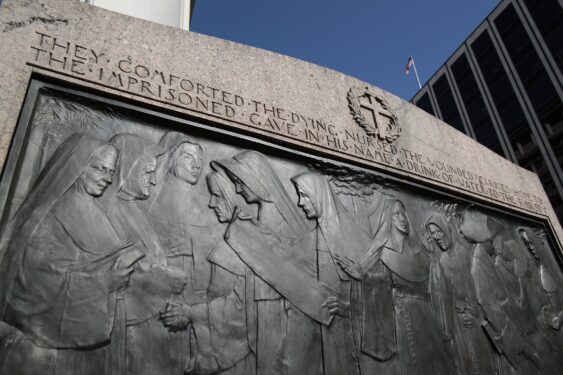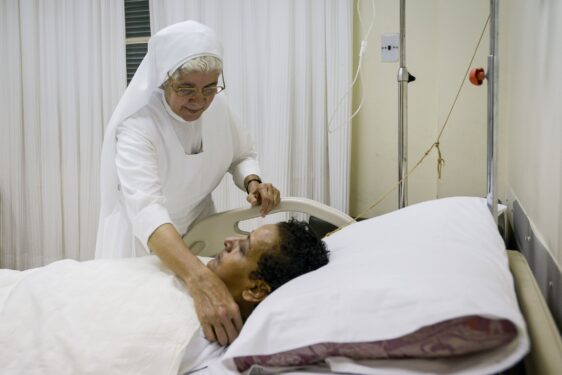
WASHINGTON — National Nurses Week is celebrated in the United States May 6-12, ending on the birthday of Florence Nightingale, known as the founder of modern nursing.
Although many people have heard of the British nurse, Nightingale, they might not know that she learned a lot about nursing from the Daughters of Charity and she also took a group of Mercy Sisters with her to help care for wounded soldiers in Russia during the Crimean War in 1854.
A Catholic Health Association article points out that Nightingale gave high praise to women religious nurses, writing: “What training is there compared with that of a Catholic nun? Those ladies who are not sisters have not the chastened temper, the Christian grace, the accomplished loveliness and energy of the regular nun.”
The nurses assisting the soldiers in the Crimean War dealt with less-than-ideal conditions in the makeshift hospitals that first had to be sanitized to help the wounded to recover. Women religious who served as nurses in the Civil War also provided care in rough settings.
More than 600 sisters from at least 12 orders of women religious were nurses in the Civil War, doing everything from bandaging soldiers in the battlefield to coordinating makeshift hospitals. They provided food, water, bandages, and basic medical care. They also gave spiritual solace to soldiers who requested it: praying with them, distributing religious medals, baptizing the dying, and writing letters home to soldiers’ families.

In the mid-1800s, Sister Mathilde Coskery, a Daughter of Charity, wrote the first comprehensive document on nursing called “Advices on Care for the Sick.” She wrote from experience as women religious were at the forefront of providing health care especially during various epidemics in the late 1800s and early 1900s.
In 1886, the Hospital Sisters of the Third Order of St. Francis opened the first Catholic nursing school in the U.S. at St. John’s Hospital in Springfield, Illinois. Other congregations similarly began opening nursing schools across the country and by 1915, 30 congregations were sponsoring 220 Catholic nursing schools, according to the Catholic Health Association.
The Catholic Church has specifically honored women religious in health care as saints or on the sainthood path such as St. Marianne Cope and Venerable Rose Hawthorne.
St. Marianne Cope, a Sister of St. Francis of Syracuse, New York, was not a nurse by title but a hospital administrator. She provided spiritual and physical care for three decades to the lepers of Molokai, Hawaii, along with St. Damien.
Sister Rose Hawthorne, who was declared venerable this year, was the daughter of author Nathaniel Hawthorne. She became a nurse in her 40s and then a religious sister after her husband died, founding the Dominican Sisters of Hawthorne, a congregation dedicated to caring for those in poverty with cancer.

In an interview with Vatican News, Mercy Sister Mary Haddad, president of the Catholic Health Association, said health care work has been in the DNA of women religious who have not only provided patient care but created “models of service” that enabled many to be cared for effectively with limited resources.
And this work continues today especially with Mercy Sisters, Sisters of Charity, Ursuline Sisters, Medical Missionary Sisters, Sisters of St. Joseph, and the Franciscan Sisters of the Poor.
Mercy Sister Kathleen Ann Kolb, regional director of health and wellness for Mercy sisters in the New York and Pennsylvania area, said being a nurse is an extension of her life as a woman religious.
She told The Tablet that part of her vows included a commitment to help those who are poor, sick, and in need of education which she said is also part of her ministry as a nurse.
Sister Kolb, who has been a nurse for 42 years of her 58 years as a sister, said she feels privileged to be part of each of these vocations.
Both ministries, she said, are about “meeting unmet needs.”
